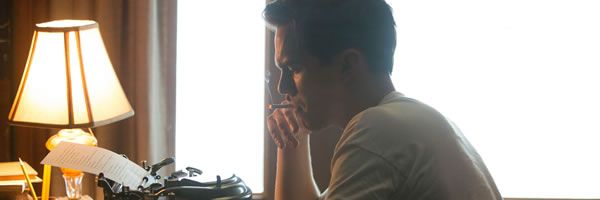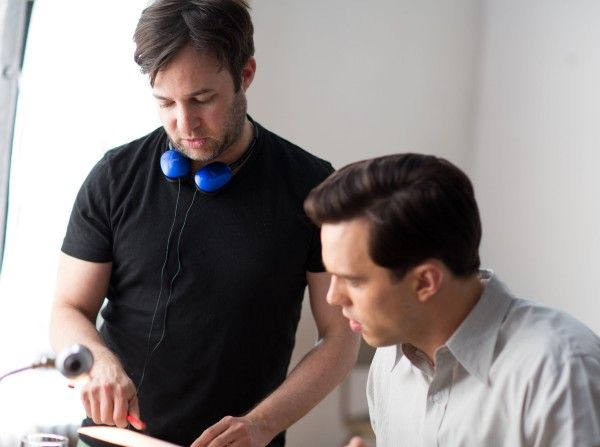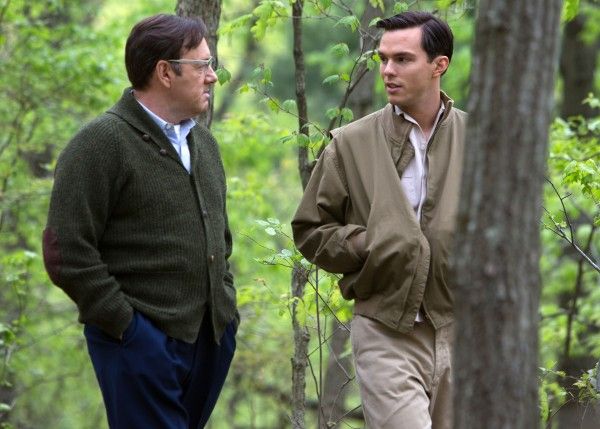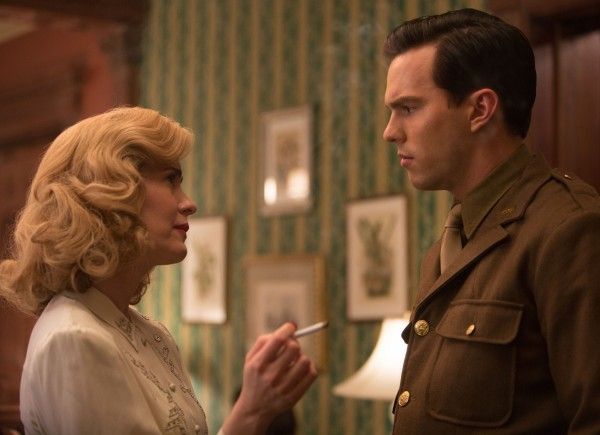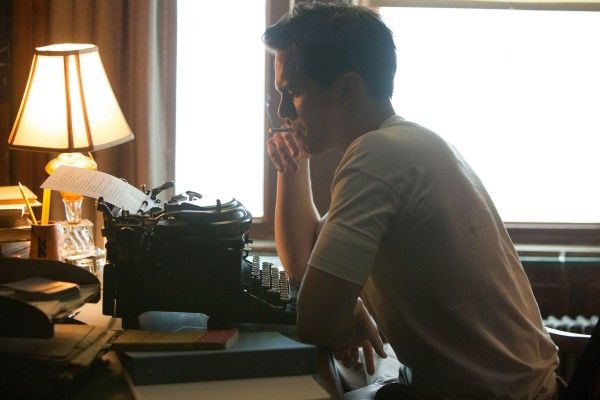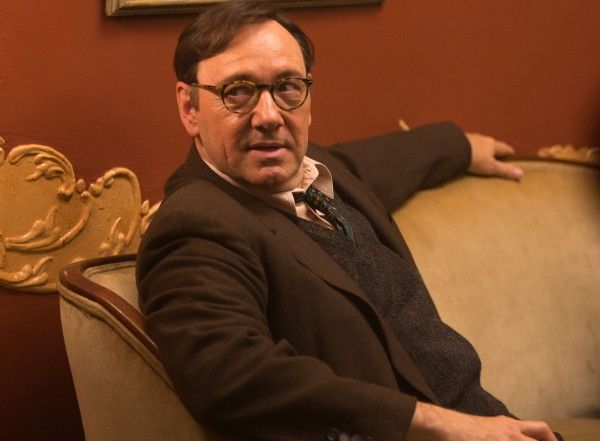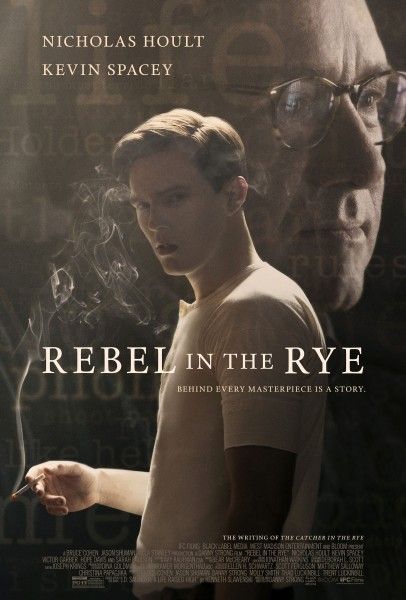From writer/director Danny Strong, the biographical drama Rebel in the Rye is a fascinating look at the life of legendary writer J.D. Salinger, one of the most renowned and enigmatic authors or our time. As a young Salinger (played brilliantly by Nicholas Hoult) struggled to find his voice, a failed love affair and his experience fighting on the frontlines of World War II helped inform the creation of his masterpiece, The Catcher in the Rye, but that also came with overnight fame and notoriety that lead him to withdraw from the public eye for the rest of his life.
During this phone interview with Collider, filmmaker Danny Strong and actor Nicholas Hoult talked about the influence of The Catcher in the Rye on so many millions of people, figuring out how to understand someone so mysterious, the importance of casting, reworking the film after screening it at Sundance, and why this movie would never have been made while Salinger was still alive. Hoult also talked about working with Simon Kinberg, who’s gone from producer to director for X-Men: Dark Phoenix, while Strong talked about the challenges of making the TV series Empire, which he co-created with Lee Daniels.
Collider: Danny, you’ve talked about seeing a J.D. Salinger biography in a book shop and buying it to read it, but did you have any interest in him, as an author and as a person, prior to that moment?
DANNY STRONG: Well, I loved The Catcher in the Rye in high school. It had been very influential on me, the way the book is influential on millions and millions of people. Also, when I was in high school, he was a major American mystery. There was no internet, and there was this big mystery of, where’s J.D. Salinger? What’s J.D. Salinger doing? What is her writing? So, when I saw this biography, I very naively was surprised that there was even enough information publicly known about him to write a whole biography. I was like, “What is this about? How did this guy do that? I’ve gotta read that! That sounds interesting to me!” That’s exactly why I bought it.
Nick, what was your first experience with J.D. Salinger’s work?
NICHOLAS HOULT: My first experience was with The Catcher in the Rye, as well. I hadn’t read many of his other works before researching for this, but I read the script and just loved it. The insight that Danny provided through that, but also the connection to the character and an understanding of him got me intrigued. I wanted to learn more, so I went back and read all of his other works and re-read Catcher. I studied biographies about him and tried to learn as much as possible.
It seems like a dream role for any actor, but what were the biggest challenges and what were your biggest fears, in playing J.D. Salinger?
HOULT: The biggest fear is that everyone has an idea of J.D. Salinger in their mind, even though there’s not really any videos or recordings of him. It’s this strange thing where you’re creating a character that people have very strong feelings about. You can’t prove to be right or wrong through impressions or things that people actually know exist. It’s about getting a real understanding of who the person was and what they stood for. With Salinger, it was his honesty and his dedication to not compromising with this art, and then how the war affected him. I just loved getting an understanding of him through learning about him, and then trying to translate that into the character.
Danny, at what point in the process did you realize that Nicholas Hoult was your J.D. Salinger?
STRONG: It was a very slow, methodical process to cast this part. It was the first movie I’ve directed and it was about J.D. Salinger, so I got it in my head that this decision was going to affect my entire directing career. My career relied on who I cast in this part, so I went very slowly. I watched footage and reels from all of these actors in Nick’s age range, and some that were a little older because I thought maybe I’d cast someone older before I quickly realized that it needed to be someone in their mid or early 20s who we could age up a little bit. So, I watched actor after actor after actor, and there are a lot of really wonderful actors in that age range. I got to Nick Hoult’s work and I was blown away by his versatility, from role to role. There was no other actor in that age range that was a chameleon the way that Nick was. I remember thinking, “This guy is like a 25-year-old Gary Oldman in a leading man’s body.” I just was blown away by him. And then, we met and he was a terrific guy. I picked four or five of the actors that I thought were terrific and I asked them to audition for me. They were all wonderful actors, and I’m not going to say who they were, but they’ve all gone on to have these fantastic things happen to them. Nick came and read, and I was hoping Nick would be the one because I just thought he was the guy, and I was right. His audition was fantastic, and he got the part the old fashioned way. He auditioned and he got it.
HOULT: I remember that I’d been walking around New York, psyching myself up for the audition. When I walked in, they said, “Do you want to sit with Danny and talk to him about it?” And I said, “Not really. We can talk after.” And then, they said, “The actress you’re gonna read with is not here yet. Do you want to wait for her?” And I was like, “No, I’m ready right now.”
STRONG: I totally agreed. I thought, “What is there to talk about? You’re here to audition. Let’s just do the audition.”
Danny, you screened this film at Sundance and IFC Films picked it up, but then you decided that you wanted to rework it. What led you to make that decision, how did IFC Films react to that decision, and how did you figure out what you wanted to rework?
STRONG: These are terrific questions. We rushed it to get it into Sundance, and I always viewed Sundance as a work in progress. I always thought I’d be working on it after the festival. And then at the festival, because it was the first time showing it to people, I realized that there were things that weren’t clear enough and that weren’t coming across, and they were things that were extremely important to me, one of them being the reason why I made the movie. It was the PTSD story and the veteran’s story, and it wasn’t clear enough. People weren’t coming out of the movie thinking they’d just seen a story that was a journey through post-traumatic stress. So, I knew I wanted to make changes. IFC bought the film, which I was really excited about because I think it’s such a cool brand. I really dig how they release movies and it felt like a great fit. And then, they tested the film and it tested pretty high, so they didn’t want to re-cut it. There was this weird moment that never happens, where the studio didn’t want changes and the filmmaker was kicking and screaming for changes. We had this stand-off, and basically I just said, “Well, let me re-cut it and if the film doesn’t test as high as the Sundance version, we’ll go with the Sundance version.” They were very cool. It wasn’t a contentious battle. They just really liked the movie and didn’t want changes, but how could they disagree with that arrangement? So, I re-cut the film, and Nick was amazing during the re-cut because I kept rewriting voice-over, over and over, and he’s record it for me, that day, on his iPhone. He was so helpful because it was so hard to figure that voice-over out. So, I re-cut it and about eight days into the re-cut, I watched it and thought, “Okay, that’s the movie.” It was so simple, too. You spend so much time struggling, and then you watch a version and go, “Okay, that’s it. We’re good.” And then, we showed it to IFC and they were so cool. They said, “We think this is better, too. Fingers crossed that it tests better.” They were on my side, but it would have weird for them, if they’d released a film that tested lower. And then, we had our big test, which was so nerve-wracking, and the film tested so much higher than the Sundance version. It was a no-brainer. It was a big crack the champagne victory night.
HOULT: It was something I’ve never experienced before. All of Danny’s ideas for the re-cut were very exciting for me to hear, and I thought he was completely right in his views and what he wanted to change, but he rewrote the script. After shooting the whole movie and submitting the movie, I then got sent the script for the movie and re-read it. By that point, I had seen it and known the old script so well that it was very difficult for me to translate. I thought that Danny’s new script was great, but it was difficult for me to step outside of it. I just think Danny is incredibly skillful and talented to be able to step back from it and look back at it objectively, and then go back in there and re-work it and mold it. I thought that was incredible, and once I saw the cut, I thought he nailed it.
STRONG: All of that was so hard to do. It’s so delicate. I had this whole idea for the re-cut, for the second half of the movie, to do this in and out of time structure. It was complicated, but I was convinced that it would be amazing. But then, I watched it and instantly new it didn’t work. This thing that I was convinced was going to be incredible just did not work, so I scrapped it and kept moving forward. It was challenging, but I knew that the film wasn’t reaching its dramatic potential at Sundance and that it wasn’t telling the story that I had always intended to tell. That was frustrating and disappointing for me. I didn’t blame anybody. It was all me. And I just really wanted another crack at trying to fix it.
How do you think J.D. Salinger might feel about this film? Do you think he’d hate the idea of it, or do you think he’d be curious about it or intrigued by it, in some way?
STRONG: I think that J.D. Salinger’s privacy was everything to him. To make this movie while he was alive would have been very disrespectful to him and would have been not a nice thing to do. I think it would have upset him very greatly. But, he’s not with us anymore and he’s a major historical figure. To explore his life, which is a life that I think could be extremely inspiring to people and help people who want to be artists, or help people who have experienced trauma, you can see how not only did he heal his trauma, but even with surviving the greatest trauma that someone can witness, he was able to create this amazing body of work as a writer and this great American masterpiece. I find that, now that he’s no longer with us, there’s so much that can be learned from his life and there’s so many people that could be inspired by it.
HOULT: It was just inspiring to inhabit him and understand his thought process. If you walk away feeling like you have a bit of an understanding of how to go for your goals and achieve things even marginally as amazing as what he did, that’s a great thing and could be wonderful for many generations to come.
Nick, you’re working on X-Men: Dark Phoenix, with Simon Kinberg as the director, and he’s been with the franchise as a producer, but it’s his first film as a director, and it’s a big budget X-Men movie. How has he been to collaborate with?
HOULT: He’s been brilliant. Obviously, he’s always been on set for all the X-Men movies that I’ve been a part of. He’s got a very clear vision for this one, in terms of how he wants to make it stand out from the other movies. It’s a very emotional, dramatically driven movie, which is fun to be a part of. In terms of my character, he’s given me some really wonderful scenes to play and, within that, great direction when we’re shooting those scenes. I’m very happy working with him and that gang. I think there’s something really interesting about working with writer/directors because they have such insight, in terms of the writing. Working with Danny, as well, you see the research that goes into every scene and every word of dialogue. Also, that ability to rewrite things on the spot is incredible.
Danny, what are you most proud of, with what you’ve gotten to do with Empire, over the seasons? Has achieving success given you a sense of freedom with what you can do with it?
STRONG: It doesn’t feel like that. I have not found freedom in success. In fact, with Empire, it feels less free, in a way. Because it’s such a big money maker for the network and studio, I haven’t experienced that on Empire, at all. I’ll say that it’s really hard because the concept of the show in Season 1, of daddy’s dying and the three sons want to take over his empire, was so clean. Every week, everyone wanted to see which son was going to get closer to taking it. And then, trying to come up with a new concept for Season 2 and Season 3 was tough. It’s a very difficult show to execute. I find it extremely challenging, and we have a terrific team on it. It’s a big group effort. Ilene Chaiken is our showrunner, and Sanaa Hamri is our producing director, and we have our whole writing staff. It’s certainly not one person, at all, that has been able to sustain that show over the three seasons, and now we’re shooting Season 4.
Rebel in the Rye is in theaters on September 8th.

